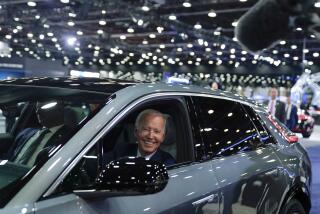Smart Firms Will Embrace Kyoto Accord
- Share via
While some segments of the business community vigorously oppose the multinational agreement reached at the global warming summit this month in Japan, there exists a very strong case for U.S. businesses to behave as if the Kyoto accord has been ratified by the Senate and will only get stronger in the future.
Clearly, the changes required in reducing fossil fuel emissions may be viewed as disruptive to some. Yet one key to competitiveness requires that businesses interpret approaching trends and effectively act on that knowledge before competitors do. The Kyoto accord offers competitive advantages to U.S. businesses that embrace it; those that don’t will pay a penalty.
Michael Porter, a Harvard scholar, economist and business strategist, writes frequently of competitive advantage for businesses and nations. When demanding consumers or “tough government regulations anticipate standards that will spread internationally,” Porter has said, “they give a nation’s companies a head start in developing products and services that will be valuable elsewhere.”
In California, the regulatory focus on cleaning the air by requiring electric and clean-fuel vehicles clearly has helped give a head start to a number of U.S. companies; advanced transportation concepts are one example. But what will happen if some businesses continue to resist these changes?
Does anyone really think that the global warming debate will dissipate soon? And given the dramatic, continuing increase in atmospheric carbon dioxide, do we really believe we won’t need to address this buildup soon? By resisting the changes, American companies risk ceding leadership in critically needed technologies to other nations more responsive to this global issue.
A case in point is the automobile industry. While General Motors, Ford and Chrysler, the U.S. “big three,” promptly attacked the accord, Toyota just as promptly acknowledged that global warming is a problem, that the company is part of the problem and therefore it needs to be a part of the solution. Honda also announced that it could live with the binding Kyoto accord and that it believed that developed countries should lead the way.
Toyota’s actions match its words. While not the first to bring electric vehicles to market, the electric version of its RAV 4 utility vehicle has achieved a driving range of 125 miles by using advanced nickel metal hydride batteries. Toyota also is the first auto maker to target four different types of clean vehicles--a hybrid electric bus, a two-passenger electric commuter car and a hybrid gasoline and electric four-passenger car, in addition to its electric RAV 4.
Toyota is now turning out its hybrid car, the Prius, making 1,000 vehicles a month at a price tag in Japan of about $17,000 apiece. The Prius and the hybrid bus, also in production, cut carbon dioxide emissions by 50%, in addition to reducing other pollutants by 90% or more. The RAV 4 electric and the electric commuter car cut global greenhouse gasses and other pollutants by more than 90% compared with gasoline-powered models. The true cost to Toyota for making the Prius is believed to be about double its current sales price. Clearly, Toyota is striving for market share and believes that a subsidized price will help it gain volume and knowledge, factors that could lead to lower costs and higher profits. This puts Toyota squarely in front as the technology leader.
When consumers around the world demand vehicles that meet the needs of the planet in addition to their personal needs, Toyota and Honda will have an early competitive advantage over America’s Big Three. If both Japan and the European Union countries comply with the Kyoto accord, as it seems they will, their auto makers will gain clear competitive advantage over American companies and be the auto-makers of choice in the developing world as well. Can we afford that?
Every business operation today should assume that global warming is real and that the Kyoto accord doesn’t go far enough. Businesses should assume that energy efficiency and environmental friendliness are increasingly important factors in the global marketplace and aggressively pursue a path that will help them remain competitive.
More to Read
Inside the business of entertainment
The Wide Shot brings you news, analysis and insights on everything from streaming wars to production — and what it all means for the future.
You may occasionally receive promotional content from the Los Angeles Times.










